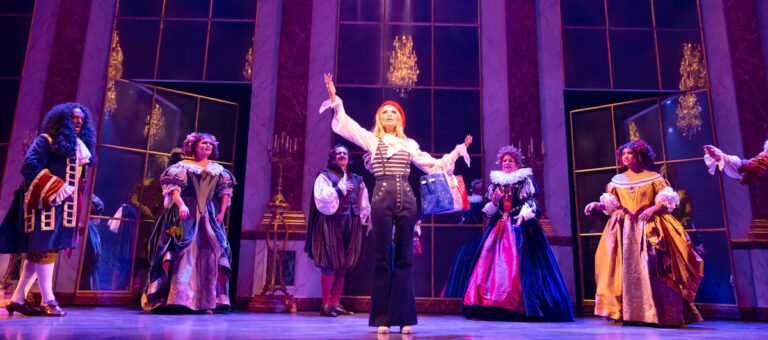Terrific ensemble cast peels away layers of essential sisterhood in Bess Wohl’s ‘Liberation’
By ALAN SMASON, WYES-TV Theatre Critic (“Steppin’ Out“)
At the beginning of Bess Wohi’s play Liberation, the character of Lizzie breaks the fourth wall to greet the expectant audience. She makes some quick, almost anxious banter to calm everyone down. That’s because just before they had taken their seats, they had turned their cell phones off and surrendered them to ushers, who placed them tightly into Faraday bags. These soft cases are commonly used in schools to lock them and prevent them from being accessed by their users and connected in any way to wifi or Bluetooth.
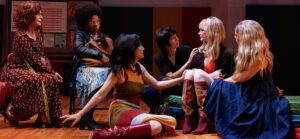
She attempts to assure them it will be all right. “They took your phones. Are we okay?” she asks and then she repeats the phrase a little more directly like a parent might calm their child “Are we okay.” She assures everyone they will get their phones back and pivots to what is likely their next question. How long will this play take before they can get their devices back.
The playwright, an actor herself, allows Lizzie, played by Susannah Flood, to then pivot to identify with this question of time and nervously she blurts out “It’s like you decide to come, you get dressed up –” and then turns and fixates on a particular audience member and playfully addresses them: “Well alright, you didn’t get dressed up” as the audience laughs at the humor there. “But you put on clothes, thank you for that” and the laughter grows.
It is not apparent at that point how important those words will become later as Lizzie ushers in what she quickly terms a “memory play.” Those kinds of plays like Tennessee Williams’ The Glass Menagerie employ a narrator whose memories are mined to examine the path back and attempt to define truth. In Liberation, Lizzie is that narrator and she assumes the role of her recently deceased mother at that point and continues to serve as the narrator for most of the two act work.

The subtitle of the play – which the audience never sees – proclaims it more precisely as “A Memory Play About Things I Don’t Remember.” Getting to the point where we walk away knowing that we don’t remember is perhaps the most salient point of the play.
In dealing with her mother’s passing, she discovers she knows a lot about what her mother did during the early days of the Women’s Liberation Movement. In order to attempt to flesh out her mother’s motivations and struggles, she decides to reconnect to the other members of her mother’s consciousness raising group. The other six female members of the cast serve that purpose, each one written to capture a hive mentality for sisterhood in an era where women had to fight for basic rights such as equal pay for equal work, the ability to get promotions or the privilege to obtain a loan from a bank without having a man cosign for her.
Directed by Whitney White, the women portray Lizzie’s mother’s friends and compatriots in this struggle. In sending out flyers, Lizzie essentially organizes the group, but attempts to sidestep a specified leadership role, insisting they must all operate on the same level. The women recognize they must support each other even though they appreciate the difficulties they all endure and some of the hypocrisy involved in trying to take a stand in a never ending fight that continues into present day.

Directed by Whitney White (Jaja’s African Hair Braiding), the casting of mostly young actresses is truly inspirational, incorporating varying racial backgrounds, sexual preferences and status as citizens all caught up in the hopeful time of the early days of the women’s movement. The weekly meetings of the group take place in a non-specific gymnasium in an unnamed Ohio town with the scoreboard occasionally used to depict the year.
White, a Chicago native, was brought up with the same Midwestern ethic that would likewise be present in the setting of 1970s Ohio and her affinity for knowing the temperament helped her direct the characters that are so beautifully written and expressed by Wohl.
Flood’s characterization of Lizzie is central to the focus of the play insofar it is her memories that inform the work. But once the other women arrive on stage, we begin to understand that we will never truly comprehend her mother’s motivations or what eventually compelled her to leave the movement and become a conventional mother and wife.
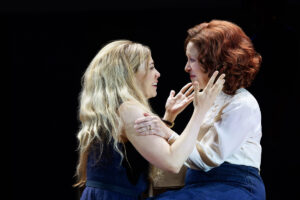
Betsy Aidem portrays Margie, the oldest member of the group, a wife whose husband cannot do anything without her help or supervision. She is suffocated by a life that puts her at the forefront of the running of the household and finds herself as an illustrative example of a “kept” woman. While fighting for her own freedom from a conventional marriage, she is a cautionary tale, taking a stand with a “do-as-I-say, don’t-do-as-I do” stance as she engages her fellow – albeit much younger – group members.
In one of the key final scenes, Margie assumes the role of Lizzie’s mother and attempts to let her “daughter” know the futility of trying to understand what motivated her. It is the closest connection the two characters share but it leaves almost as many questions as it gives answers.
It is not the only time another character assumes the role of Lizzie’s mother. In dealing with the awkward feelings she entertains towards her father Bill, played by Charlie Thurston, Lizzie allows Joanne (Kayla Davion) to become her and thus her mother as she attempts to fathom the dynamic between the liberated woman who gave up her commitment to the women’s movement to marry and have children. Joanne, who is Black, had briefly appeared in one earlier scene and she volunteers to become a bigger part of the narrative, speaking to both Lizzie and the audience characterizing her as being “under-utilized.”
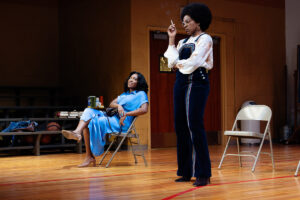
The Black experience in the women’s movement is also mined with the character of Celeste, played quite extraordinarily by Kristolyn Lloyd. A hardened proponent for civil rights, Celeste is mindful of her racial background, but not as forthcoming with her sexual identification. As everyone else in the group is White, she represents the “otherness” of the women’s movement that was largely seen as heterosexual women seeking better partnerships in traditional marriages.
One of the best scenes in exploring the dynamics of Black women occurs later in Act II when Joanne calls Celeste out as being closeted and not owning up to who she is. There is a schism between conservative and liberal values held by both Black women and it is an important part of incorporating the differences that still exist in today’s society.
Susan (Adina Verson), a true Marxist revolutionary, comes to the group as a radical whose Jewish family has broken ties with her. She finds family and acceptance within the group, although her unorthodox lifestyle runs afoul with most of the more traditional group’s makeup.
For comic relief, there is Isadora, an illegal Italian immigrant who grabs onto the women’s movement as a way of changing the system. Played by Irene Sofia Lucio, she explains she is married “for the Green card,” but admits to using her body when necessary to get ahead. Dora (Audrey Corsa), on the other hand, is a very blonde office worker, whose fantastic build and girl next doo looks belie her dedication to the movement.
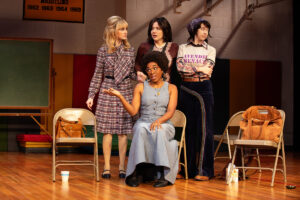
The reason for the Faraday bags becomes obvious in the beginning of Act II as the darkened lights of the theater become illuminated as the members of the group follow a consciousness raising act of liberation in freeing their clothes from their bodies. The discussion that ensues as they explore what they like most and least about their bodies gives us further insight into these characters and what the women’s movement was all about.
It is probably going to be what most people will talk about when it comes to Liberation. Those that take that position would be wrong. The nude scene is tastefully presented and embraced by the actors on stage in a way that should make us say “Who cares?”
What matters most is the experience shared by these women and the growth Lizzie experiences as she becomes her mother, trying to plumb what it was that made her tick, and giving her insight into her own life experience as a mother and wife. We learn to truly like these characters and what a courageous stand they took at very long odds not so very long ago.
Indeed, it is through the collective strength of this group of stalwart women, bonded together in sisterhood and supportive of one another, that they truly find liberation.
Liberation by Bess Wohl continues its Broadway run at the James Earl Jones Theatre, 138 W. 48th St. in New York. For tickets click here.
Director: Whitney White
Scenic Design: David Zinn
Costume Design: Qween Jean
Lighting Design: Cha See
Co-Sound Design: Palmer Hefferan & Ben Truppin-Brown




